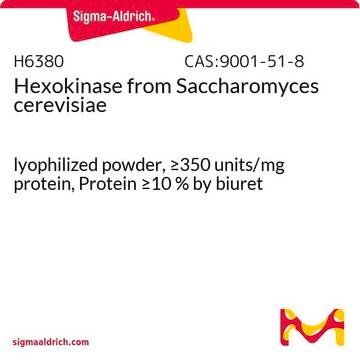11426362001
Roche
Hexokinase (HK)
suspension, suitable for detection
Synonym(s):
HK, Hexokinase
Sign Into View Organizational & Contract Pricing
All Photos(1)
About This Item
Recommended Products
form
suspension
Quality Level
specific activity
~450 units/mg protein (At 25 °C and pH 7.6 with D-glucose and ATP as the substrates.)
packaging
pkg of 1 mL (1,500 U)
manufacturer/tradename
Roche
pH range
6.0-8.0
application(s)
detection
shipped in
wet ice
storage temp.
2-8°C
General description
ATP:D-hexose 6-phosphotransferase
Hexokinase consists of 486 amino acids and has a molecular weight of 57,000 D (SDS-PAGE) in citrate/phosphate buffer. It may form dimers under other buffer conditions.
Hexokinase exists in three isozymes, namely type I, type II and type III that differ in subcellular localization, catalytic and regulatory properties. The type I isozyme serves a catabolic function facilitating the entry of glucose into glycolytic metabolism for energy production. The type II and type III enzymes perform anabolic functions, such as generating G6P for glycogen synthesis or metabolism through the phosphogluconate pathway for lipid synthesis. Type I and type II isozymes have been found to be bound to mitochondria. The type III isozyme has been found to have perinuclear localization in several cell types.
Application
Hexokinase (HK) has been used in enzyme assays and chemiluminescence assay. It has also been used to determine ATP concentration.
Use Hexokinase for the determination of D-glucose, D-fructose, and D-sorbitol in food or biological research samples. Hexokinase may also be used for the assay of other saccharides, which are convertible to glucose or fructose, and is, therefore, useful in the assay of many glycosides.
Hexokinase has been used in the enzymatic detection of nitric oxide and in the measurement of ATP by luminescence method.
Hexokinase has been used in the enzymatic detection of nitric oxide and in the measurement of ATP by luminescence method.
Biochem/physiol Actions
Hexokinase catalyzes the conversion of hexoses to hexose-6-phosphate in an ATP-dependent manner. It is also called as the glycolytic enzyme as it catalyzes the first step in glucose metabolism with the formation of glucose-6-phosphate (G6P). In eukaryotes, it functions as a glucose sensor.
Quality
Contaminants: <0.002% PGI, <0.0005% G6P-DH and GR, each, <0.001% CK, MK, 6-PGDH, and ADH, each, <0.05% GIDH and invertase (β-fructosidase), each, <30 μg/ml glucose (enzymatically)
Unit Definition
Unit Assay: For measuring hexokinase activity 0.22 M glucose in 0.1 M triethanolamine buffer, pH 7.6, 6.5 mM MgCI2, 2.7 mM ATP, 0.83 mM NADP is incubated in the presence of 1.7 U glucose-6-phosphate dehydrogenase with an appropriate amount of hexokinase (10–20 mU) at +25 °C (total volume: 3.0 ml). The enzyme activity is calculated from the increase of absorbance at 340 nm ( = 6.3 [I × mmol/l-1 × cm-1]) or 365 nm ( = 3.5 [I × mmol/l-1 × cm-1]).
Physical form
Suspension in 3.2 M ammonium sulfate solution, pH approximately 6.5
Preparation Note
Activator: Hexokinase requires Mg2+ ions (Km = 2.6 mM) for activity. Catecholamines too increase activity.
Stabilizers: Thiols
Stabilizers: Thiols
Other Notes
For life science research only. Not for use in diagnostic procedures.
Storage Class Code
12 - Non Combustible Liquids
WGK
WGK 1
Flash Point(F)
does not flash
Flash Point(C)
does not flash
Certificates of Analysis (COA)
Search for Certificates of Analysis (COA) by entering the products Lot/Batch Number. Lot and Batch Numbers can be found on a product’s label following the words ‘Lot’ or ‘Batch’.
Already Own This Product?
Find documentation for the products that you have recently purchased in the Document Library.
Customers Also Viewed
Is there a pace-of-life syndrome linking boldness and metabolic capacity for locomotion in bluegill sunfish?
Binder TR, et al.
Animal behaviour, 121, 175-183 (2016)
Stefan Hof et al.
Frontiers in medicine, 9, 867298-867298 (2022-05-17)
Acute hemorrhage results in perfusion deficit and regional hypoxia. Since failure of intestinal integrity seem to be the linking element between hemorrhage, delayed multi organ failure, and mortality, it is crucial to maintain intestinal microcirculation in acute hemorrhage. During critical
Estrogen signaling prevents diet-induced hepatic insulin resistance in male mice with obesity
Zhu L, et al.
American Journal of Physiology. Endocrinology and Metabolism, 306(10) (2014)
John E Wilson
The Journal of experimental biology, 206(Pt 12), 2049-2057 (2003-05-21)
The first step in metabolism of glucose (Glc) is usually phosphorylation, catalyzed by hexokinase. However, the Glc-6-P produced can then enter one or more of several alternative pathways. Selective expression of isozymic forms of hexokinase, differing in catalytic and regulatory
Xu Deng et al.
FEBS open bio, 4, 200-212 (2014-03-22)
The yeast Saccharomyces cerevisiae IMA multigene family encodes four isomaltases sharing high sequence identity from 65% to 99%. Here, we explore their functional diversity, with exhaustive in-vitro characterization of their enzymological and biochemical properties. The four isoenzymes exhibited a preference
Our team of scientists has experience in all areas of research including Life Science, Material Science, Chemical Synthesis, Chromatography, Analytical and many others.
Contact Technical Service




